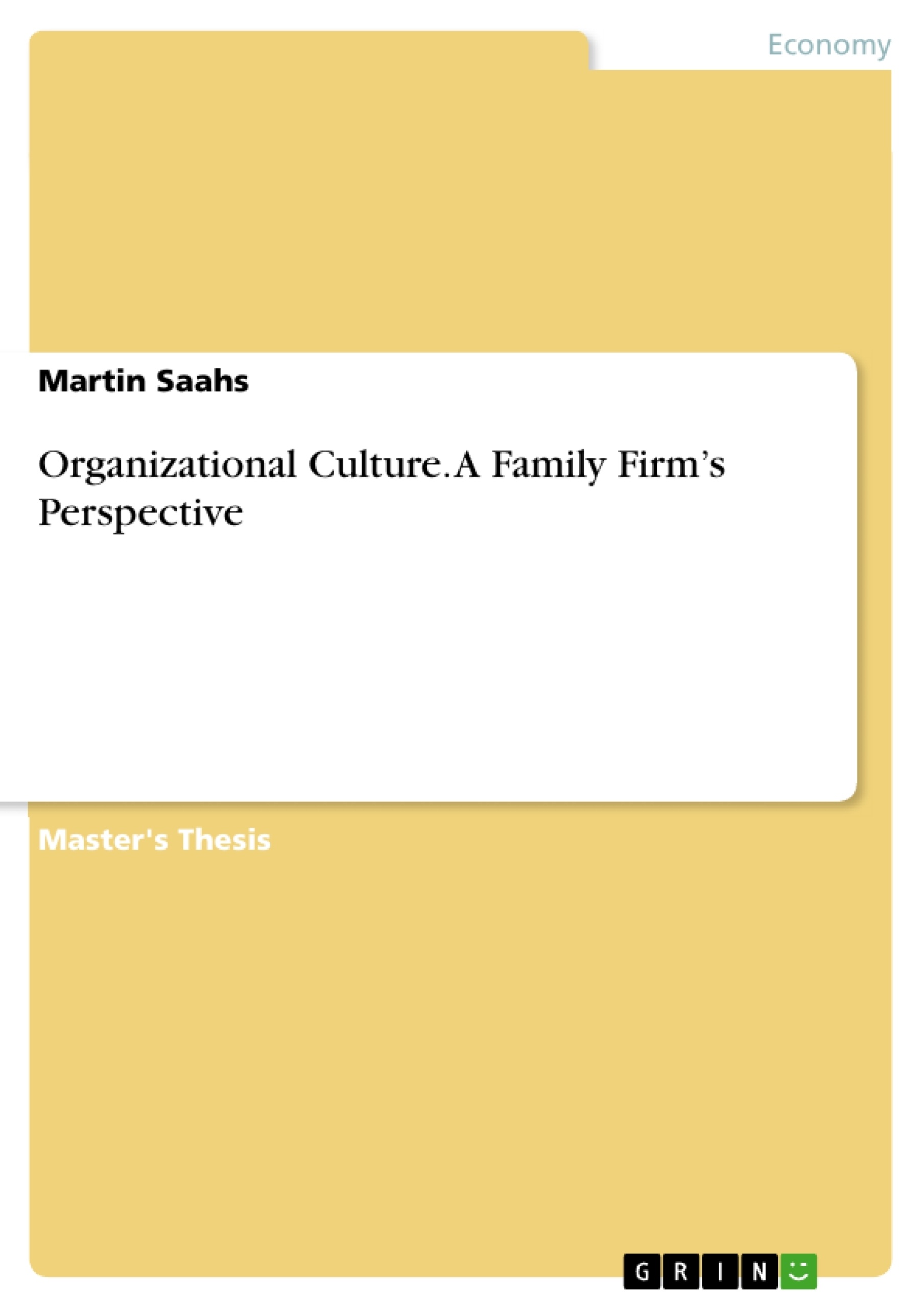The aim of this thesis is to provide the necessary theoretical background to conduct an empirical study on family businesses and their cultures.
In the following pages it will become clear that neither family firms nor culture are fields were empirical studies can be conducted after a static manual. The definitions and explanations will rather be of use as tools for building up an analytical framework for an empirical study.
A variety of hypotheses will be constructed including instructions on the usage combinations.
Inhaltsverzeichnis (Table of Contents)
- INTRODUCTION
- Aims
- Relevance
- Structure
- THE FAMILY FIRM
- The F-PEC scale
- The power dimension
- The experience dimension
- The culture dimension
- The F-PAC scale - resume
- Usage
- Theories used in family firm research
- The agency theory
- The stewardship theory
- Resource based view
- The family firm - resume
- ORGANIZATIONAL CULTURE
- Organizational culture - according to Edgar H. Schein
- Schein's levels of culture
- Organizational culture - according to Mats Alvesson
- Organizational culture - according to Joanne Martin
- CHARACTERISTICS OF A FAMILY FIRMS' ORGANIZATIONAL CULTURE
- The role of the founder
- The strength of culture
- Entrepreneurship and the family firm
- Short- vs. long-term orientation
- Individual vs. group cultural orientation
- Internal vs. external cultural orientation
- Coordination vs. control
- Organizational culture and performance
- Family systems' influence on family firms
- HYPOTHESES APPLICATION
- CONCLUSION
- LIMITATIONS
- PERSONAL OPINION
Zielsetzung und Themenschwerpunkte (Objectives and Key Themes)
This master's thesis examines the organizational culture of family firms. The study aims to explore the specific characteristics that define the cultural landscape of these businesses and analyze their impact on the overall performance of the organization. The research uses theoretical frameworks from various academic fields, including agency theory, stewardship theory, and resource-based view, to provide a comprehensive understanding of the dynamics within family firms.- The unique characteristics of organizational culture in family firms
- The role of the founder in shaping organizational culture
- The influence of family systems on the dynamics within family firms
- The relationship between organizational culture and performance in family firms
- The application of relevant theories to explain the cultural dynamics of family firms
Zusammenfassung der Kapitel (Chapter Summaries)
- Introduction: This chapter lays out the aims and relevance of the research, outlining the key objectives and motivations behind the study of family firm organizational culture. The chapter also provides a clear overview of the structure of the thesis.
- The Family Firm: This chapter introduces the concept of the family firm, exploring the key features that differentiate it from other business models. It examines various theories, such as the agency theory and the stewardship theory, which help to understand the unique dynamics within family firms. The chapter also introduces the F-PEC scale and F-PAC scale, which provide a framework for assessing family firm characteristics.
- Organizational Culture: This chapter explores the concept of organizational culture from different perspectives, drawing on the insights of prominent theorists such as Edgar H. Schein, Mats Alvesson, and Joanne Martin. It examines the various levels of culture and the factors that contribute to its development and manifestation within organizations.
- Characteristics of a Family Firms' Organizational Culture: This chapter delves into the specific characteristics that define the organizational culture of family firms. It examines the role of the founder, the strength of culture, and the various dimensions of cultural orientation. The chapter also explores the relationship between organizational culture and performance in family firms.
- Hypotheses Application: This chapter applies the theoretical frameworks and insights gained from previous chapters to analyze specific hypotheses related to the relationship between family firm culture and organizational performance.
Schlüsselwörter (Keywords)
The primary focus of this thesis is on the organizational culture of family firms. Key concepts include the role of the founder, the strength of culture, the influence of family systems, and the impact of culture on organizational performance. The research utilizes theoretical frameworks such as agency theory, stewardship theory, and resource-based view to analyze the unique dynamics of these firms.Frequently Asked Questions
What makes the organizational culture of a family firm unique?
Family firm culture is often characterized by the founder's influence, long-term orientation, and the overlap between family values and business goals, which can lead to a very strong and distinct corporate identity.
What is the F-PEC scale in family business research?
The F-PEC scale measures the influence of the family on a business through three dimensions: Power, Experience, and Culture. It helps quantify how "familial" a firm actually is.
How does the founder shape a company's culture?
The founder establishes the initial values, norms, and beliefs. In family firms, these often persist through generations, acting as a "cultural glue" but sometimes also resisting necessary changes.
What is the difference between Agency Theory and Stewardship Theory?
Agency Theory assumes potential conflict between owners and managers (self-interest). Stewardship Theory suggests that managers in family firms often act as "stewards" who identify with the firm's success and family legacy.
Does a strong culture always improve performance in family firms?
While a strong culture can boost motivation and coordination, it can also lead to stagnation if it becomes too inward-looking. The thesis analyzes how different cultural orientations impact overall business performance.
- Citar trabajo
- Martin Saahs (Autor), 2013, Organizational Culture. A Family Firm’s Perspective, Múnich, GRIN Verlag, https://www.grin.com/document/265768



